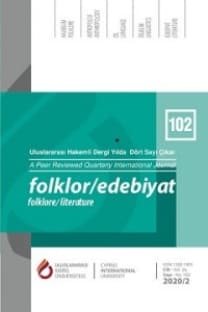Biz ve Cesur Yeni Dünya'da İlkelcilik
Primitivism in We and Brave New World
___
- Adorno, T. W. (1963). Aldous Huxley und Utopie. Prismen: Kulturkritik und Gesellschaft (s. 92-117). München: DTV.
- Atwood, M. (2007). Introduction, Brave New World (s. 6-15). London: Vintage Books.
- Beauchamp, G. (1977). Cultural Primitivism as Norm in the Dystopian Novel. Extrapolation, 19 (1), 88-96.
- Beauchamp, G., (1991). The Shakespearean Strategy of Brave New World. Utopian Studies, 4, 60-64.
- Boas, G. (1968). Primitivism. P. P. Wiener (Ed.). Dictionary of the History of Ideas III (s. 577-598). New York: Charles Scribner's Sohn. Erişim: 25.11.2015, www.xtf.lib. virginia.edu.
- Çörekçioğlu, H. (2011). Zamyatin'i ve Biz'i Okumak: Doğa ve Kültür Geriliminden Geleceğe Bakış. Felsefelogos, 41, 93-113.
- Harrison, T. P. (1940). Aspects of Primitivism in Shakespeare and Spenser. Studies in English, 20, 39-71.
- Horigan, S. (1998). Nature and Culture in Western Discourses. London: Routledge.
- Huxley, A. (1995). Science and Civilization. D. Bradshaw (Ed.). The Hidden Huxley (s. 105- 114). Eastbourne: Anthony Rowe.
- Huxley, A. (2007). Brave New World. London: Vintage Books.
- Huxley A. (2010). Cesur Yeni Dünya (Ü. Tosun, Çev.). İstanbul: İthaki Yayınları.
- Huxley, A. (1964). Cesur Yeni Dünya (E. Gürol, Çev.). İstanbul: Varlık Yayınevi.
- Kristeller, P. O. (1961). Renaissance Thought, New York: Harper & Row.
- Lovejoy, A. ve Boas, G. (1997). Primitivism and Related Ideas in Antiquity. London: John Hopkins Press.
- McCarthy, P. A. (1994). Zamyatin and the Nightmare of Technology. Science Fiction Studies, 11, 122-129.
- Mattelardt, A. (2005). Gezegensel Ütopya Tarihi (Ş. Çiltaş, Çev.). İstanbul: Ayrıntı Yayınları.
- Meckier, J. (2006). Brave New World and the Anthropologists: Primitivism in A. F. P. Firchow ve B. Nugel (Ed.). Aldous Huxley: Modern Satirical Novelist of Ideas: a Collection of Essays by Joreme Meckier (s. 225-240). Münster: Lit Verlag.
- Montaigne, M. d. (1993). On Cannibals (J. M. Cohen). Essays (s. 105-118). London: Penguin Books.
- Orwell, G. (1976), Nineteen Eighty-Four, George Orwell Omnibus: Complete Novels (s. 741-924). London: Secker and Warburg.
- Panofsky, E. (1955). Meaning in the visual Arts. USA: Anchor Books.
- Reiff, R. H. (2010). Aldous Huxley: Brave New World. New York: Marshall Cavendish.
- Shakespeare, W. (2006). The Tempest, New York: Yale University.
- Shakesperare, W. (2000). Fırtına (B. Bozkurt, Çev., 3. bs.). İstanbul: Remzi Kitapevi.
- Wells, R. H. (2005). Shakespeare's Humanism. Cambridge: Cambridge University.
- Zamyatin, Y. (1970). Scythians? (M. Ginsgburg, Çev.). M. Ginsgburg (Ed.). A Soviet Heretic: Esssays by Yevgeny Zamyatin (s. 21-33). Chicago: University of Chicago Press.
- Zamyatin, Y. (1999). We (M. Gingsburg, Çev.). New York: Harpercollins.
- Zamyatin, Y. (1988). Biz (F. Tülek, Çev.). İstanbul: Ayrıntı Yayınları.
- ISSN: 1300-7491
- Yayın Aralığı: 4
- Başlangıç: 1994
- Yayıncı: -
Şehre Uzak Birbirine Yakın: TOKİ Yapracık Toplu Konutlarında Sosyal Yapı
Türk-Arap Müziğinde Etkileşim ve Müşterek Unsurlar
Peter Weiss'deki Mitik Direnme Eyleminin Halk Edebiyatımızdaki Ortak Yanları
Türk Atasözlerinde Çatışma Sebepleri
Nihal MAMATOĞLU, Rasim Özgür DÖNMEZ., Seçil KESKİN, Burcu DÖNMEZ ALBAYRAK
Bir tütün köyünde tarımsal dönüşüm ve kadın emeği
Biz ve Cesur Yeni Dünya'da İlkelcilik
Küreselleşme Sürecinde Kültürel Melezme Örneği OlarakYemek Kanalları ve Programları
Cicero'nun Eserlerinde Denizcilik Kaynaklı Eğretilemeler
